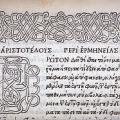357. David Lines on Aristotle's Ethics in the Renaissance
Posted on
An interview with David Lines on the Renaissance reception of Aristotle's Nicomachean Ethics.
Themes:
Further Reading
• D.A. Lines, “The Importance of Being Good: Moral Philosophy in the Italian Universities, 1300–1600,” Rinascimento 36 (1996), 139–93.
• D.A. Lines, “Faciliter Edoceri: Niccolò Tignosi and the Audience of Aristotle’s Ethics in Fifteenth-Century Florence,” Studi medievali 40 (1999), 139–68.
• D.A. Lines, “The Commentary Literature on Aristotle’s Nicomachean Ethics in Early Renaissance Italy: Preliminary Considerations,” Traditio 54 (1999), 245–82.
• D.A. Lines, Aristotle’s Ethics in the Italian Renaissance (ca. 1300-1650): The Universities and the Problem of Moral Education (Leiden: 2002).
• D.A. Lines, “Moral Philosophy in the Universities of Medieval and Renaissance Europe,” History of Universities 20 (2005), 38–80.
• D.A. Lines, “Humanism and the Italian Universities,” in C.S. Celenza and K. Gouwens (eds), Humanism and Creativity in the Renaissance (Leiden: 2006), 327-46.
• D.A. Lines, Aristotelis Ethicorum Moralium Nicomachiorum libri X una cum ... graecorum explanationibus, Latin translation by Johannes Bernardus Felicianus, 2 vols (Stuttgart: 2006).
• D.A. Lines, “Reorganizing the Curriculum: Teaching and Learning in the University of Bologna, c.1560-c.1590,” in M. Feingold (ed.) History of Universities (Oxford: 2012), 1-59.
• D.A. Lines, ‘Aristotle’s Ethics in the Renaissance’, in J. Miller, The Reception of Aristotle’s Ethics (Cambridge: 2012), 171–93.
• D.A. Lines and S. Ebbersmayer (eds), Rethinking Virtue, Reforming Society: New Directions in Renaissance Ethics, c. 1350–1650 (Turnhout: 2013).
• D.A. Lines and E. Refini (eds), Aristotele fatto volgare: Tradizione aristotelica e cultura volgare nel Rinascimento (Pisa: 2014).
• D.A. Lines, “Defining Philosophy in Fifteenth-Century Humanism: Four Case Studies,” in A. Ossa-Richardson and M. Meserve (eds), Et Amicorum: Essays on Renaissance Humanism and Philosophy in Honour of Jill Kraye (Leiden: 2018), pp. 281–97.







Comments
Congratulations on your 10th!
Hi Peter, I've been listening for over a year now and still about 300 episodes behind - I'm starting to feel like Achilles trying to catch that slippery turtle! I teach at a midwest university (where most of the nice people are) and use your podcasts as the main introductory text in my ancient and medieval classes, and it's going better than ever -- I think that the chance of listening to their "readings" while they walk, drive or work out makes a big difference to my students. But beyond that I terribly enjoy the podcasts and the interviews myself -- I always learn something new, and come away with at least some delightful bad joke (my favorite so far being "wholly Toledo", ep. 150).
So how do you do it? Could you do a podcast telling us about your preparatory work for the podcasts? And if it's not much to ask, could you bring back the "now, I know what you are thinking," if only for this one occasion? I kind of miss it.
In reply to Congratulations on your 10th! by Alfredo
Thanks
Thanks so much! That's really great that your students find the podcasts helpful.
I actually got complaints about "now I know what you're thinking" and it did seem to be getting a little old. But you're right, I should bring it back for a special occasion.
And as far as the process goes I have been asked that before, maybe I will do a blog post since I'm not sure it'd be of sufficiently wide interest to send it out as a podcast.
Congrats on the 10th as well
I've not been listening for 10 years, but the last few years I've listened to this series and I'm even going back through many of them. Their puntastic! Giraffes have made it wonderful, along with non-existent siblings, which I've actually used myself in conversation. I torture my 6th and 9th grader with episodes in the car occasionally, and honestly have bought way too many of the books that were mentioned as source material from interviewers. The best part for me is that you "mind the gap", and this perspective is so very welcome compared to the few philosophy classes and their focus that I once had. Thank you for all this work.
Magnificence and Christian poverty
Thank you for your valuable insights.
Just a thing I wanted to comment upon. You mention that magnificence would be opposed to the Christian virtue of poverty. If we turn back time to the medievals, however, and read Aquinas's compendium of virtues, he authored a long thesis on why magnificence is in fact a virtue, which he sorts under fortitude (Summa II-II: 134). At the same time, and in line with your argument, Aquinas argues that poverty (of spirit) is intrinsic to the heavenly virtue of hope (Summa II-II: 19, 12).
An important point which Aquinas seemingly makes is that Christian poverty does not void the need for spending and distributing money in a right manner. Christian poverty thus appears to be described by Aquinas as the opposite of a lack of proper judgment with regard to money. In particular, Aquinas mentions the purchase of a suitable house as a virtuous act - as opposed to renting, one would assume.
An emerging question would be: If someone submits perfectly to God, why would the expected outcome be worldly poverty and not in fact worldly riches?
In reply to Magnificence and Christian poverty by Fredrik
Magnificence
Yes, that's a nice point - and a good illustration of the way that Aquinas is more generally at pains to keep as much as he can of the Aristotelian system of virtues, while still making a central place for the Christian virtues. The move he's making here is actually also a nice case of the way that Stoicism worked its way into Christian ethics: here the Stoic element is the idea that dealing with wealth would involve understanding that it is only a tool to be used for being good, and has no real value in and of itself. This may shed some light on your last question: given that wealth is only an instrument, God might see to it that it gets into the right hands and can be used well. But of course, and also going back to antiquity, there was the long-standing idea that ethical heroism within Christianity had as pretty much its first step the giving away of all one's wealth and embracing a life of destitution (think of the biographies of the desert fathers). So there is a tension here, or at least, two different ways that Christian thinkers could go in thinking about the best possible attitude towards wealth.
In reply to Magnificence by Peter Adamson
Heroes and magnificence
Thank you very much for your kind reply.
Aquinas would probably counter your dichotomy by stressing that the heroes were right to denounce worldly goods for the spiritual good, which is in concord with his virtue of liberality, and that a hero would dispose of his wealth not pusillanimously, randomly or negligently, but through acts of magnificence in accord with right reason.
Aquinas is explicit in calling fearlessness vicious (Summa II-II: 126) except it cases where it can be excused due to lack of intelligence, and elevates magnanimity, magnificence, patience and perseverance as preferred manifestations of fortitude.
Perhaps the most explicit warning against a certain current understanding of heroic virtue is found in Aquinas's warning against pertinacy: "The pertinacious man exceeds by persisting inordinately in something against many difficulties: yet he takes a certain pleasure in the end, just as the brave and the persevering man. Since, however, this pleasure is sinful, seeing that he desires it too much, and shuns the contrary pain, he is like the incontinent or effeminate man." Giving up in due time is thus manly according to Aquinas. Anyhow, I will contemplate the concept of heroic virtue some more, and once again I am very grateful for your insights.
Island Hopping
Hey Peter,
Love St. Thomas as the current theme and was just curious as to any good inside baseball, e.g. maybe specific West Indian allusions, that led to that choice.
Always a fan.
Cheers,
— Karl Young
In reply to Island Hopping by Karl Young
St Thomas
Yes, well noticed! Chike gets credit for this, not me, but the idea was to have something with a Caribbean theme to reflect the many thinkers from there who are being covered in the series.
Machiavelli
Lovely, informative episode. One can imagine how "the Renaissance man," especially in Italy, could find inspiration in Aristotle's portrait of the virtuous man. After all, Italian city-states did resemble Greek poleis in that citizens could achieve success in political life and in that possibilities for learning were abundant (at least, that is the picture I have). But then one wonders about Machiavelli - here is a thinker who seems so independent of Aristotle and even of Christianity, attuned instead to the history of Rome. This kind of suggests to me that there were two "rebirths" in the Italian Renaissance - one of Greece, and the other of Rome - and these are very different strands, sometimes more in agreement (like with stoicism) and sometimes in conflict. All of this is a gross oversimplification of course. But it does reflect the relationship in the ancient world, and later in Christendom too, with the rivalry between Rome and Constantinople and all. That Aristotelianism (scholasticism) was later abandoned in the West can be seen not "merely" as the result of the rise of "modernity" on account of new discoveries, etc., but perhaps as the triumph of Rome(?) Does it make sense to try and examine Bacon, Descartes, Hobbes, and see if their influences are more Roman than Greek? Nay, it is too complicated: there are Hebraic influences, vernacular ones, and simply fresh new thoughts suggested by their genius and circumstances.
I would love to hear your thoughts.
In reply to Machiavelli by Guy of Jerusalem
Greek and Roman Renaissance
That's a great point, and something I also noticed and thought about a little while working on the Italian Renaissance for the podcast. I think that the Latin and Greek revivals are intimately connected: consider for instance that Cicero is a main source of information for Hellenistic philosophy (as he still is for us) and also encouraged the idea that Aristotle wrote beautifully. My idea is that the Greek revival was basically just an import from Byzantium, and the Latin revival is a kind of imitation or application of that whole mindset to the language of the West, i.e. Latin. But there is no doubt much more to be said here.
In reply to Greek and Roman Renaissance by Peter Adamson
GREEK AND ROMAN RENAISSANCE
Wow, that is a bold idea!
Do you mean a continuous import from Byzantium? (because there was the Latin rule over Constantinople in the 13th century, not to mention the rediscovery of the Corpus Juris Civilis in the 11th). Or do you mean on account of the fall of Constantinople in 1453 and the wave of intellectual refugees?
Re: the role of Cicero - the suprelatives can roll freely and we would not be exaggerating.
But re: your idea, I keep having this image of someone whose car broke down and he keeps trying to start it up again. The descendants of the Romans felt all to well, for generations, that they had lost their empire and the idea of rebirthing it somehow was on their minds for a thousand years, until finally they could decalre without impropriety that it had happened. The "Greeks bearing gifts" throughout the ages brought battery cables and spark plugs, but the Latins kept near the car, maintaining it and turning the keys in the switch at times.
In reply to GREEK AND ROMAN RENAISSANCE by Guy of Jerusalem
Greeks bearing gifts
I had more in mind the second factor, the wave of intellectuals from the East, which actually started before 1453. But they obviously come into a situation where there is already a humanist movement going on, given for example how early Petrarch is. So, it's a complicated question with a complicated answer I guess.
Add new comment